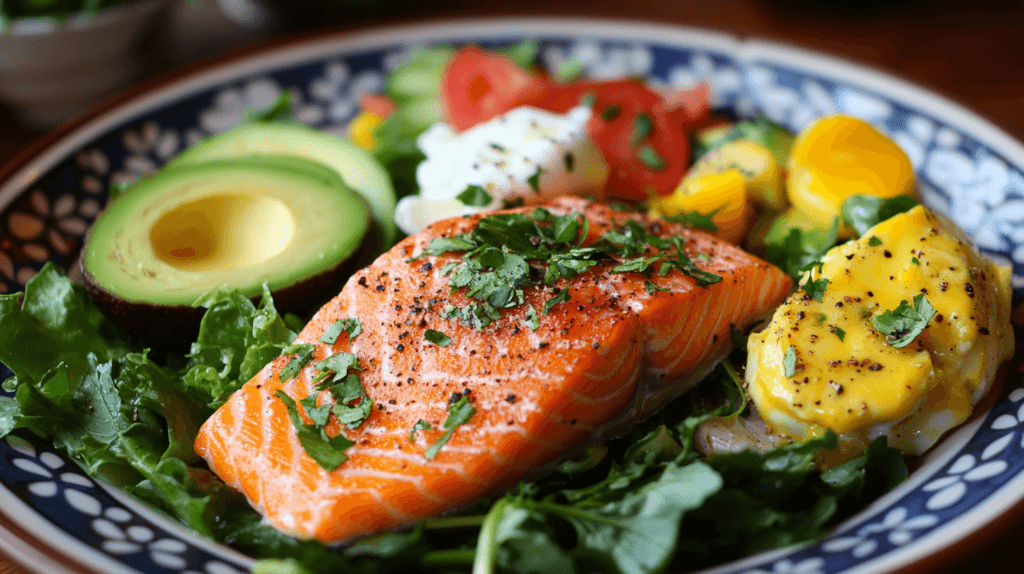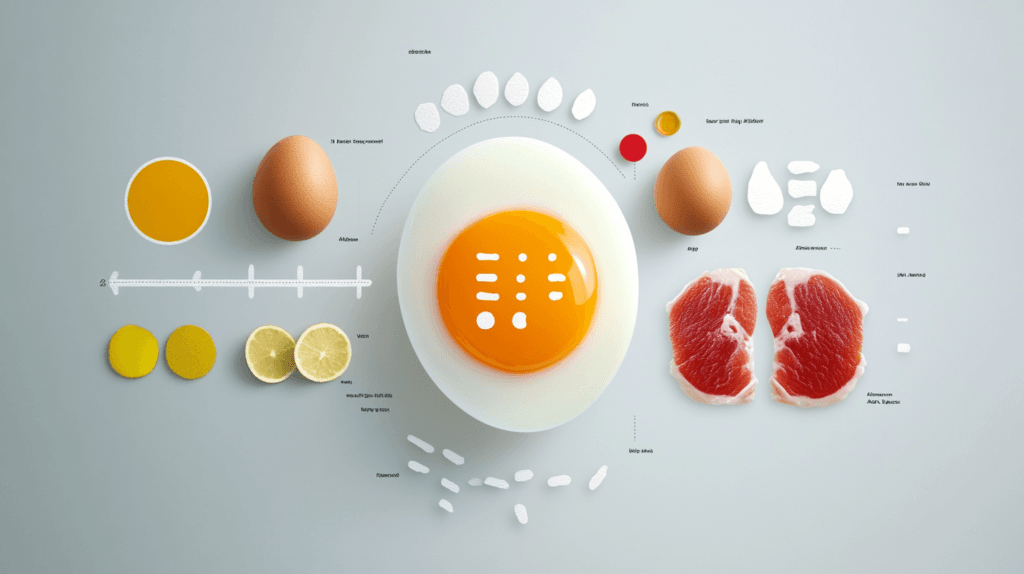Cortisol is often referred to as the stress hormone because it plays a significant role in how the body responds to stress. It is secreted by the adrenal glands and is crucial for various bodily functions, including metabolism, immune response, and maintaining blood sugar levels. However, when cortisol levels are too high or remain elevated for extended periods, it can lead to health problems like anxiety, weight gain, and a weakened immune system.
Diet plays a vital role in regulating cortisol levels. Some foods are known to raise cortisol levels, while others help keep them in check. Among these, eggs often come under scrutiny due to their high cholesterol content and their potential influence on hormone production. So, do eggs increase cortisol? Let’s dive into the science behind cortisol, diet, and the role of eggs.
Table of Contents
Understanding Cortisol
What Is Cortisol?
Cortisol is a steroid hormone produced in the adrenal cortex, a part of the adrenal glands. It is released in response to stress or low blood glucose levels as part of the body’s “fight or flight” response. While cortisol is essential for survival, chronic stress or poor lifestyle choices can cause cortisol levels to become imbalanced.
Functions of Cortisol in the Body
Cortisol has several vital functions, including:
- Regulating metabolism: It helps convert proteins, fats, and carbohydrates into energy.
- Suppressing inflammation: Cortisol reduces inflammation and allergic reactions.
- Managing blood sugar levels: It ensures that the body has enough glucose for energy.
- Supporting the stress response: Cortisol helps the body react quickly to stressful situations by increasing heart rate and blood pressure.
Factors Influencing Cortisol Levels
Several factors can influence cortisol levels, such as:
- Stress: Emotional, physical, or mental stress can trigger the release of cortisol.
- Sleep patterns: Poor sleep or lack of rest disrupts cortisol production.
- Diet: Certain foods can either raise or lower cortisol levels.
- Exercise: While moderate exercise helps reduce cortisol, intense workouts can temporarily elevate it.
By managing these factors, individuals can maintain healthier cortisol levels and prevent related health issues.
The Role of Diet in Cortisol Levels

Diet has a significant influence on cortisol production. Certain foods can either increase or decrease cortisol levels based on their composition, how they affect blood sugar, and their impact on overall stress in the body. Understanding these relationships is crucial to designing a diet that supports hormonal balance.
Foods That Raise Cortisol Levels
Some foods and dietary habits can lead to elevated cortisol levels. These include:
- High-sugar foods: Eating foods with a high glycemic index, like candy, pastries, and sugary drinks, can spike blood sugar levels, leading to an increase in cortisol.
- Caffeine: While moderate caffeine consumption may boost focus and alertness, excessive intake can trigger cortisol release, especially under stress.
- Processed foods: Diets high in processed and refined foods can cause inflammation, indirectly leading to increased cortisol production.
Foods That Help Lower Cortisol Levels
Certain foods can naturally reduce cortisol levels and promote relaxation:
- Whole grains: Foods like oats and quinoa help stabilize blood sugar, reducing cortisol spikes.
- Fruits and vegetables: Rich in antioxidants, these support the body’s ability to combat stress. Bananas and citrus fruits are particularly effective.
- Fatty fish: Omega-3 fatty acids in fish like salmon and mackerel help regulate cortisol levels and reduce inflammation.
- Herbal teas: Chamomile and green tea are known for their calming properties.
Nutritional Composition of Eggs

Eggs are a powerhouse of nutrition, packed with high-quality proteins, healthy fats, vitamins, and minerals. To assess whether eggs influence cortisol levels, it’s essential to understand their nutritional makeup.
Macronutrient Profile of Eggs
A single large egg contains:
- Proteins: About 6 grams of high-quality protein, which is easily digestible and essential for muscle repair and hormone production.
- Fats: Roughly 5 grams of fat, with a mix of saturated and unsaturated fats.
- Carbohydrates: Less than 1 gram, making eggs a low-carb food option.
Micronutrients Found in Eggs
Eggs are rich in vitamins and minerals that contribute to overall health:
- Choline: Vital for brain health and liver function.
- Vitamin D: Important for bone health and immune system support.
- B Vitamins: These help with energy production and stress management.
- Selenium and Zinc: Powerful antioxidants that combat oxidative stress, which is often linked to high cortisol levels.
The Relationship Between Eggs and Cortisol
Do Eggs Directly Impact Cortisol Levels?
Research on eggs and cortisol is limited, but there is no evidence to suggest that eating eggs directly increases cortisol levels. Instead, eggs may play a supportive role in hormone regulation due to their nutrient density. For example, the proteins and vitamins in eggs can help maintain balanced blood sugar levels, reducing cortisol spikes associated with blood sugar fluctuations.
How Eggs Affect Hormonal Balance
Eggs contain several nutrients that indirectly influence hormones, including cortisol:
- Proteins: These help stabilize blood sugar, reducing the stress response that elevates cortisol.
- Choline and B Vitamins: These are critical for neurotransmitter function, which impacts stress management and cortisol regulation.
- Vitamin D: Emerging research suggests that low levels of vitamin D are linked to elevated cortisol. Eggs, being a source of vitamin D, may contribute to maintaining healthier cortisol levels.
Cholesterol in Eggs and Hormones
Cholesterol as a Precursor to Steroid Hormones
Cholesterol is often misunderstood as something harmful, but it is, in fact, a vital substance in the body. It serves as the building block for all steroid hormones, including cortisol, testosterone, and estrogen. Since cortisol is a steroid hormone, the cholesterol found in eggs could theoretically play a role in its production.
One large egg contains about 186 mg of cholesterol, primarily found in the yolk. While dietary cholesterol contributes to the body’s cholesterol pool, research shows that the cholesterol consumed through food has a minimal impact on blood cholesterol levels for most people. The liver naturally adjusts its cholesterol production based on dietary intake.
Connection Between Cholesterol and Cortisol Production
While cholesterol is essential for cortisol synthesis, it’s important to note that the body regulates this process tightly. Eating eggs provides a natural source of cholesterol that the body can use for various functions, but it doesn’t mean eating eggs will lead to excess cortisol production. Instead, eggs can support overall hormonal balance when consumed as part of a healthy diet.
Proteins in Eggs and Stress Response
Role of Proteins in Regulating Cortisol Levels
Proteins are crucial for maintaining steady blood sugar levels and reducing stress responses. When you consume protein-rich foods like eggs, they slow down the absorption of carbohydrates, preventing rapid blood sugar spikes and crashes. This helps to avoid stress-induced cortisol release.
Moreover, proteins provide amino acids that the body uses to produce neurotransmitters like serotonin and dopamine, which are vital for mood regulation. A balanced mood helps keep cortisol levels in check.
Egg Proteins and Stress-Related Hormone Responses
The protein content in eggs, particularly albumin found in egg whites, is of high biological value, meaning it contains all the essential amino acids needed for the body’s functions. These amino acids, such as tryptophan, play a role in reducing stress and promoting relaxation. While eggs may not directly lower cortisol, they can support an overall diet aimed at managing stress and hormone levels.
Myths About Eggs and Cortisol
Common Misconceptions
There are several myths surrounding the relationship between eggs and cortisol, such as:
- Myth: Eating eggs raises cortisol directly.
Fact: No scientific evidence supports this claim. Eggs provide nutrients that can influence hormones but do not directly cause cortisol spikes. - Myth: High cholesterol in eggs leads to hormonal imbalances.
Fact: Dietary cholesterol from eggs has minimal impact on the body’s cholesterol levels for most individuals.
Debunking the Myths
It’s important to understand that cortisol regulation is influenced by a combination of factors, including overall diet, lifestyle, and stress management. Eggs, as a nutrient-dense food, can be part of a balanced diet without fear of raising cortisol unnecessarily.
Other Foods Impacting Cortisol
Dietary habits go beyond eggs when it comes to managing cortisol levels. Including the right foods and avoiding those that can raise cortisol is essential for overall health.
High Glycemic Index Foods
Foods with a high glycemic index, like white bread, sugary cereals, and processed snacks, cause rapid spikes in blood sugar. This triggers a release of cortisol as the body attempts to stabilize blood sugar levels. Opting for whole grains and low-glycemic alternatives can prevent this stress response.
Caffeine and Its Effect on Cortisol
Caffeine, found in coffee, tea, and energy drinks, can temporarily increase cortisol levels, especially when consumed in large amounts. Moderation is key to preventing cortisol spikes while still enjoying the benefits of caffeine.
Healthy Substitutes
Replacing cortisol-triggering foods with healthier options is a smart strategy. For example:
- Swap sugary snacks with nuts or seeds.
- Replace processed breakfast cereals with oatmeal or quinoa.
- Choose herbal teas like chamomile instead of caffeinated beverages.
Lifestyle Tips for Managing Cortisol
Managing cortisol levels effectively goes beyond diet. A holistic approach that incorporates lifestyle changes can significantly reduce stress and maintain hormonal balance. Here are some practical tips:
Importance of a Balanced Diet
A well-rounded diet that includes whole foods, lean proteins, healthy fats, and plenty of fruits and vegetables is critical for hormone regulation. Combining eggs with other cortisol-lowering foods like spinach, avocados, or berries can enhance their benefits.
Role of Exercise
Exercise is a double-edged sword when it comes to cortisol. Moderate-intensity activities like walking, yoga, or swimming can help lower cortisol levels. However, high-intensity or prolonged workouts can temporarily increase cortisol, so balance and recovery are essential.
Stress Management Techniques
Chronic stress is a leading cause of elevated cortisol. Techniques such as:
- Mindfulness meditation: Helps calm the mind and lower cortisol.
- Deep breathing exercises: Activates the parasympathetic nervous system, reducing stress.
- Adequate sleep: Poor sleep patterns can disrupt cortisol regulation. Aim for 7-9 hours of quality sleep each night.
Incorporating Relaxation Activities
Hobbies and activities that promote relaxation, such as gardening, reading, or listening to music, can reduce stress and help maintain healthy cortisol levels.
Frequently Asked Questions (FAQs)
Can Eggs Be Part of a Cortisol-Lowering Diet?
Yes, eggs can be part of a cortisol-lowering diet. They provide essential nutrients that support hormonal health. For more details on cortisol-lowering foods, visit The Cortisol Detox Diet.
How Many Eggs Can I Eat Daily for Balanced Hormones?
Most healthy individuals can consume 1-3 eggs per day. To complement your diet, consider a Cortisol Cocktail for Weight Loss for added stress-relief benefits.
What Are Some Other Good Protein Sources for Hormone Regulation?
Other excellent sources of protein for maintaining hormonal balance include:
- Lean meats like chicken or turkey.
- Fish rich in omega-3 fatty acids, such as salmon or tuna.
- Plant-based options like lentils, beans, tofu, and quinoa.
Learn about stress-reducing dietary strategies in Does Ginger Lower Cortisol.
Is It Safe to Eat Eggs Every Day?
For the majority of people, eating eggs daily is safe and beneficial. Eggs provide a balanced mix of nutrients without significantly impacting blood cholesterol or cortisol levels. However, as with any food, moderation is key.
Are There Any Foods That Should Be Avoided to Manage Cortisol?
Yes, it’s best to avoid high-sugar, processed, and caffeine-laden foods that can spike cortisol levels. Replacing these with nutrient-dense, whole foods can help manage cortisol effectively.
Do Organic or Free-Range Eggs Make a Difference?
While organic eggs may offer better nutritional quality due to the hens’ diets, they do not directly impact cortisol levels. For recipes promoting a balanced diet, try this Cortisol Cocktail Recipe.
Conclusion
Eggs, as a nutrient-dense food, do not directly increase cortisol levels. Instead, they provide a rich source of proteins, vitamins, and minerals that support overall hormonal health. The cholesterol in eggs is essential for steroid hormone production, including cortisol, but the body carefully regulates this process. When consumed as part of a balanced diet, eggs can contribute to a healthy lifestyle without negatively affecting cortisol levels.
To manage cortisol effectively, focus on a holistic approach that combines a balanced diet, regular exercise, adequate sleep, and stress management techniques. Eggs can be a valuable part of this strategy, offering versatility and nourishment.

